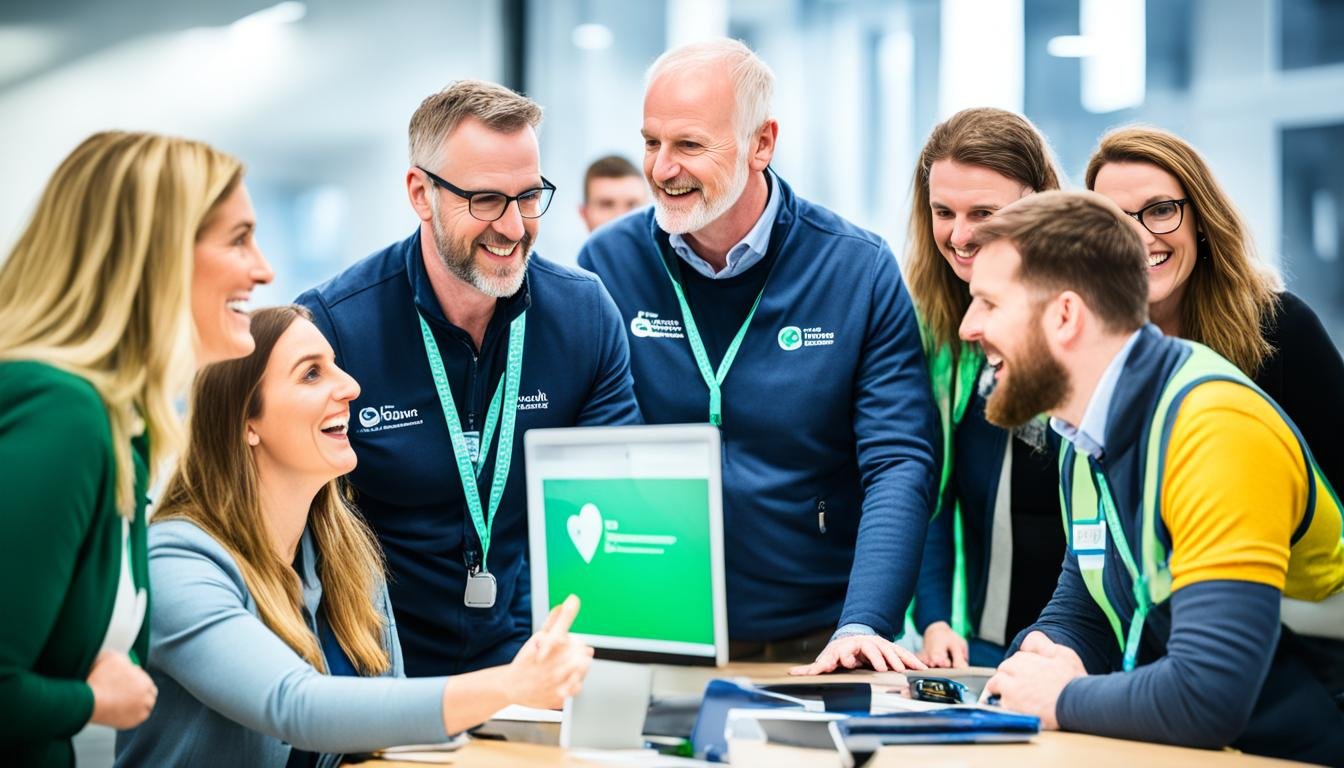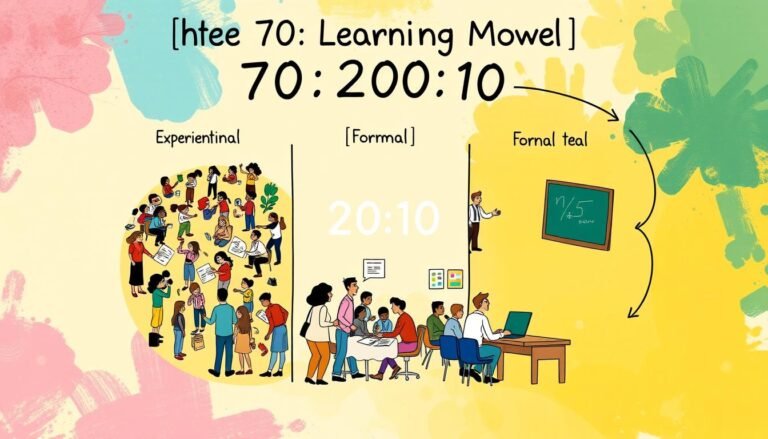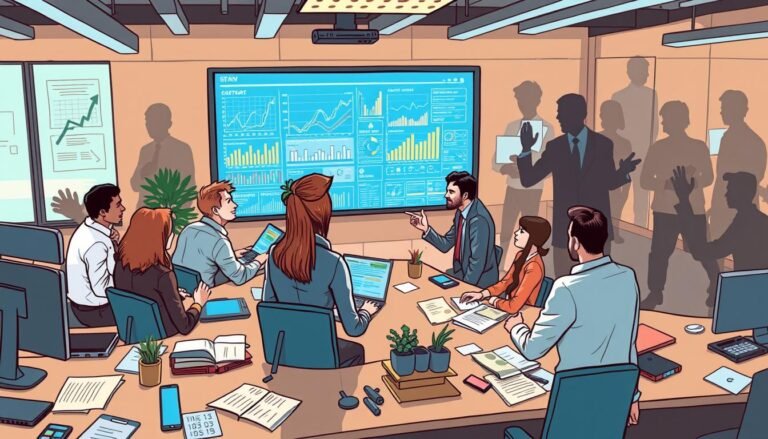Transforming the Irish Workplace with Learning and Development
In 2021, just 14% of Irish adults took part in education or training. Yet, Ireland is strong in digital skills and has high rates of young adults in further education compared to other countries. However, many adults still need future-ready skills, which is a big challenge.
Colin Marks, with an MBA, and founder of Forester Firm Consultancy, says learning and growth are crucial in Ireland’s workplaces. He shares how learning the Irish language helps in professional fields. It’s not just about honoring traditions but improving how we communicate, adjust, and lead at work.
By learning languages, Colin says we get better at listening and being empathetic, especially towards those not fluent in English. His story shows how continuous learning changes your outlook, essential for career growth. Learning a language also improves how we think, helping us make better choices, thus advancing the Irish workforce.
The Importance of Learning and Development in the Irish Workplace
The OECD Skills Strategy Ireland report shows how vital workplace education is. It highlights the need for a well-rounded skill set in Ireland. This set should include cognitive, social, emotional, and job-specific skills. Although young Irish adults do well in education and digital skills, they face challenges such as skill gaps in adults.
“In Ireland, 18% of the adult population (16-65) are at or below level 1 on a five-level literacy scale, and 25% are at or below level 1 for numeracy. A notable 55% of adults have low digital skills. These gaps indicate a strong need for comprehensive workplace education initiatives to enhance Irish talent cultivation and career advancement in Ireland.”
59% of people say their poor literacy or numeracy skills stop them from getting good jobs. 85% have said no to jobs or training because of their skill gaps. Fixing these gaps is key to meeting job market needs and pushing career advancement in Ireland.
Workers who learn new skills feel more confident and can use new technology better. People with good literacy skills are twice as likely to get job training than those without. This proves that helping adults learn new skills improves their jobs. It also helps make a stronger workforce, important for Irish talent cultivation.
The government is pushing for lifelong learning through the NSS 2025 and other steps. They want 64.2% of adults to be in education or training by 2030. This is more than the EU goal of 60%. By supporting workplace education and lifelong learning, Ireland plans to have a skilled and innovative workforce ready for the future.
Benefits of Employee Training and Upskilling Programs
Investing in programs that enhance employee skills offers many benefits. It boosts a company’s performance and helps it adapt to changing job needs.
Increased Employee Retention
Training and upskilling programs improve how long employees stay. A report by LinkedIn shows that 93% of companies worry about losing staff. When employees can shift to new roles within a company, 75% choose to remain there. Ongoing learning keeps workers interested. It also reduces the cost of replacing staff by building a skilled and loyal team.
Enhanced Productivity
Training helps make employees perform better. Compliance, product, and technical training make workers more skilled. The Gallup report of 2023 found that only 23% of workers are truly engaged. Giving them the right skills and resources improves their focus. This boosts their productivity.
Boosted Innovation
Learning leads to new ideas in workplaces. Quality assurance training helps keep high standards, product and soft-skills training boosts sales and relationships. Through specialized training, employees learn new methods and suggest new ideas. This keeps the company competitive in a changing industry.
Investing in training makes a company more likely to keep staff, work better, and come up with new ideas. It’s good for both the employees and the company. It creates a more nimble, informed, and creative environment.
Challenges Facing Workplace Education in Ireland
Ireland has made great strides in digital skills and seen big growth lately. However, there are still big obstacles to workplace education. Many adults don’t have the skills needed for the future. This could make it hard for the workforce to adjust to new technologies and industries.
Skills Gaps and Imbalances
There’s a clear skills gap in Ireland, especially in sectors that need to improve labor productivity. Ireland is ahead of the EU in digital skills, but there’s still a big imbalance in the job market. Not enough adults are learning throughout their lives. In 2021, only 14% of Irish adults between 25 and 64 were in education or training. This is much lower than countries like Sweden and Finland, which had rates of 35% and 31%. A McKinsey report says Ireland must act fast to fix these issues as jobs change because of technology and automation.
Barriers to Participation in Lifelong Learning
In Ireland, several challenges keep people from learning all their lives. These challenges include not enough access, motivation, and support. Although the National Skills Strategy 2025 tries to tackle these issues, regional differences and high housing costs make things harder. Learning throughout life can improve skills, lead to better pay, boost productivity, and increase trust in society. But these benefits are not fully realized because of the problems people face in trying to keep learning. The recent big shift to digital learning and work, sparked by COVID-19, is a chance and a challenge to make learning more inclusive.
Ireland’s efforts to tackle these issues, like with the National Skills Strategy 2025, are crucial. They’re key to building a workforce that can handle changes in the future economy.
Professional Development Opportunities for Irish Workers
Today, getting ahead in your career in Ireland means focusing on professional development. The country offers many chances to learn and grow, like through the Skills to Advance program. This program helps workers in changing fields stay skilled and adaptable to new trends.
Springboard+ is another helpful program. It lets you take free courses from certificates to master’s degrees. What’s great is that these courses are flexible and fit different life schedules. They are for people who are employed, unemployed, or looking to join back the workforce.
Career enrichment also gets a big boost from traineeships and apprenticeships across Ireland. These opportunities can last up to twenty months and offer hands-on learning. They’re developed with industry needs in mind, so graduates come out with skills that are in demand.
“Skillnet Ireland supports employers by advancing the competitiveness, productivity, and innovation of businesses. Our focus is on building a skilled workforce ready to meet contemporary challenges,” highlights the organization’s mission.
Apprenticeships are a solid choice for building your skills. They can take two to four years and include lots of on-the-job training. It’s worth noting that many Irish employers see the benefits and are offering apprenticeship programs.
The Right Course and support from Local Enterprise Offices are also very helpful. They give advice and training options for personal and business growth. By using all these resources, Irish workers can stay relevant and grow their careers, finding more chances for success.
Implementing Talent Management Strategies for Organizational Growth
Talent management strategies drive organizational growth. They involve finding skill needs, making development plans, and checking if these plans meet business goals.
Identifying Skill Needs
First, we must find out what skills are needed. This step is crucial and requires knowing what skills the company has now and what it needs in the future. Ireland is ahead in digital skills but faces challenges due to uneven skill distribution in the job market.
Creating Development Plans
Next, we make plans to improve skills. These plans focus on getting rid of any skill gaps and helping employees grow professionally and personally. The pandemic showed how important it is to have flexible plans. Programs like Enterprise Ireland’s Spotlight on Skills help companies fill skill gaps effectively.
Monitoring Progress and Success
Keeping an eye on progress is vital. This step makes sure our talent management strategies work well. It includes checking in often and making changes as needed. Even though Ireland is not at the top for lifelong learning, staying up to date is key to success. Monitoring helps companies make sure their people and goals grow together.
Case Study: Successful Upskilling Initiatives in Ireland
The Spotlight on Skills program by Enterprise Ireland is a prime example of an effective upskilling initiative. It helps businesses by first figuring out skills gaps and then planning to fill them. This program is moving forward based on encouragement from the OECD Ireland Skills Strategy Report.
In 2020, Skillnet Ireland worked with 19,000 companies, mostly small to medium enterprises (SMEs) and small businesses. They helped 70,000 employees learn new skills through over 8,500 programs. These included everything from general courses to more specialized upskilling and management training.

Skillnet Ireland is key in creating new programs in areas like aviation leasing, AI, fintech, and manufacturing digitalization. These options provide quality paths for career growth, meeting the changing needs of the Irish workforce.
Looking forward, the focus for the next five years is to grow training opportunities. This includes a push for more digital training, help for SMEs, and actions for the climate. Special attention will be on getting more women into tech roles and on eco-friendly programs in finance, wind energy, and clean water.
The Skills to Advance program, run by SOLAS and backed by the Department of Further and Higher Education, is another great step. It helps SMEs with easy training grants, making sure everyone can take part. This yearly financial support makes sure these training options keep growing, fitting in well with Ireland’s plan for job skills development.
The strategic upskilling initiatives Ireland is taking show its strong way of building a skilled workforce. This helps the workforce adapt and do well in a changing economy.
Building an Organizational Learning Culture
Building a strong learning culture is key to ongoing success for any business. It’s about making sure everyone easily shares knowledge. People should always be looking to improve their skills.
Fostering Continuous Improvement
Making things better all the time is vital in a learning workplace. Not enough UK workers think their jobs help them grow. One way to step this up is by having a rule that lets staff spend 2+ hours learning every week. Making learning available when needed and helping with costs can boost this learning atmosphere.
Encouraging Knowledge Sharing
Sharing what you know at work is key for everyone to learn and create new things. Even though 98% of L&D people want a strong learning culture, only about a third think they’ve made it happen. Using tools like emails, messaging, and talks from managers helps get everyone involved. Also, games in learning systems that reward people can make training activities more interesting.
A culture focused on always learning and sharing helps a company do well and handle tough times, like the COVID-19 crisis. This shows just how important it is to keep learning and sharing at work.
The Role of Government and Policy in Enhancing Learning and Development
Government and policy are key in shaping learning and development. They’re behind many programs like the Statutory and Mandatory Training and LETD Standard Programmes. These are detailed in a key document, “Transforming the Irish Workplace with Learning and Development”.
The Health Services People Strategy 2019-2024 is making big changes in education. It wants to grow the skills of both individuals and teams. The goal is to give all HSE employees fair and clear chances to learn more, which will help them improve their skills.
The Department of Education’s Governance Framework is a big part of this. It sets a plan to make sure education programs match bigger government goals. It covers how things are organized, planned, and checked, making sure education continually moves forward.
This focus on skills isn’t just about rules. It’s about making an environment where people are accountable, open, and act with integrity. For example, good leadership is critical for meeting education goals and serving the public well. The governance also describes how to behave, how to check results, and how to make sure everyone follows the best practices.
The Governance Framework has five main parts. These parts talk about things like the Department’s overview, the roles of leaders, and how to manage boards and checks. All this helps education grow every day, supporting a culture of always learning more.
The government’s work in learning is a big mix of tasks. They make sure everyone gets a fair education. They also work to keep the system clear and honest. All these parts come together to make learning and growing better for everyone in Ireland.
Performance Optimization Through Continuous Learning
Learning all the time is key for better work performance these days. If companies encourage their workers to keep learning, they stay ahead in the job market. They use digital tools for learning, which means each worker can work at their own pace and focus on what they need.
Leveraging Digital Tools
Digital learning tools are changing how companies help their workers learn non-stop. A good example is online courses, virtual reality that helps you practice real-life situations, and live web seminars. With these, workers can learn anytime they want. This way, employees feel motivated on their own. Plus, their bosses can see how they are doing and give tips anytime, making sure everyone gets better each day.
Customizing Training Programs
It’s very important to adjust training so workers learn what is useful for both the company and themselves. This could be learning about rules, all knowledge needed for their job, how to become leaders, or new tech skills. By focusing training on what really moves the company forward, everyone becomes better at their job. This also makes the company more competitive and productive.
By making learning part of how a company runs, it boosts both personal work quality and brings up new ideas. Using digital tools and customized training, a company can create a team that can adjust quickly, is highly skilled, and prepared for what’s to come. This matches with ways of always getting better, like Lean, Kanban, and Six Sigma, which say we should always be learning and growing.








